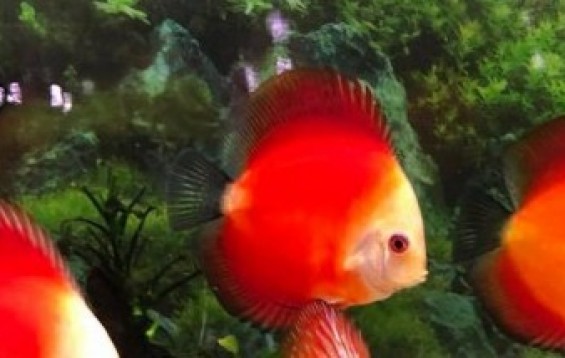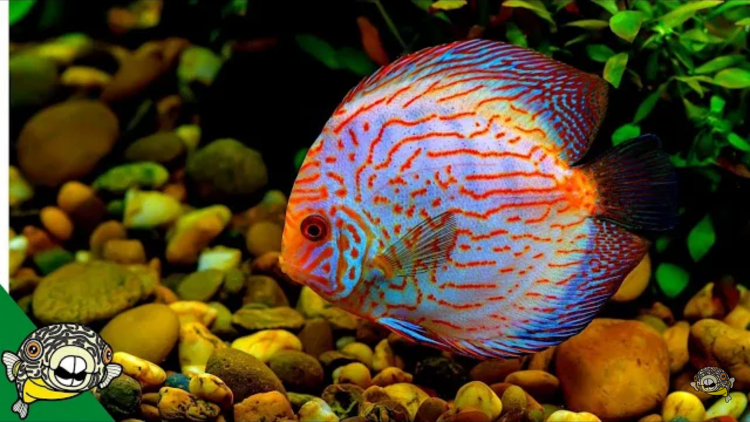- Name:
Marlboro Super Red Discus
(View AKA's) - Family: Cichlidae
- Species: Discus
- Scientific Name: Symphysodon sp


General info about Marlboro Super Red Discus
These fish are disc-shaped and can reach up to 10 inches. They aren’t easy to keep so only experienced aquarists should own them. Discus fish are extremely popular in the hobby, as such, they have been highly hybridized. Nowadays there are plenty of color, pattern and shape varieties.
To keep these fish in captivity, water pH should be between 6.0 and 6.5 and water temperature should range from 82ºF to 86ºF. The tank should be dimly lit and have open areas for swimming, plants, hiding places, and a sandy or gravel substrate. They are peaceful and can be kept in a community tank. Discus can be kept as a single fish and for such a 50-gallon tank is the minimum required, to keep more than one, a larger tank is necessary.
Marlboro Super Red Discus Diet & Nutrition
This species is carnivorous. In a tank, they can be fed with live or frozen foods like bloodworms or brine shrimp.
Breeding & Spawning Marlboro Super Red Discus
To breed this species in captivity, the fish should have their own tank with a water pH of 5.5 to 6 and water temperature of 82ºF to 88ºF. The pair will start by cleaning a flat surface like a plant or a rock and then will lay their eggs on that surface. Fry takes 60 hours to hatch and for the first 5 to 6 days, they will feed on mucous of their parent’s skin.
Marlboro Super Red Discus Origin
This species can be found in the Amazonian tributaries. It inhabits still or slow mobbing waters.
Caution with Marlboro Super Red Discus
They should be moved as little as possible.
Acclimating Marlboro Super Red Discus
The water in which these fish are packaged is different from the water in the tank since these fish are extremely sensitive to water conditions the acclimation process is very important. This process should never be rushed. Aquarium lights should be off for at least the first 4 hours of the fish in the new tank and it should not be fed in the first 24h. There are two acclimation methods: Floating Method and the Drip Method.
Floating method - the aquarium lights should be off and lights in the room should be dim, the bag in which the fish is should be placed on the surface of the water to float for about 15 minutes, this allows the water in the bag to adjust to the water in the tank. The bag should then be cut under the knot and the top edge of the bag should be rolled down one inch, then ¼ cup of the aquarium water should be added to the bag, this step should be repeated every 4 minutes until the bag is full, then half the water of the bag should be discarded and the bag should be put to float again and ¼ cup of the aquarium water should be added to the bag every 4 minutes until the bag is full. Afterward, the Discus can be moved into the aquarium.
Drip method – the aquarium lights should be off and lights in the room should be dim, the bag in which the fish is should be placed on the surface of the water to float for about 15 minutes, this allows the water in the bag to adjust to the water in the tank. The bag contents should be poured into a 1-gallon bucket that has never been cleaned with any chemicals, the fish should be enterally submerged. A siphon, using airline tubing, should be set up and a drip line should run from the main aquarium to the bucket. Several loose knots should be tied in the airline tubing to regulate flow. Sucking the end of the airline tube that goes to the bucket will begin a siphon, the flow should be regulated to 2 to 4 drips per second. Once the water in the buckets doubles, half should be discarded and the process should be repeated until it doubles again. Afterward, the fish can be moved to the aquarium.
Original Detail
| Name | Species | Family | Scientific Name | More Detail | Added by |
|---|---|---|---|---|---|
| Marlboro Super Red Discus | Discus | Cichlidae | Symphysodon sp | These fish are disc-shaped and can reach up to 10 inches. They aren’t easy to keep so only experienced aquarists should own them. Discus fish are extremely popular in the hobby, as such, they have been highly hybridized. Nowadays there are plenty of color, pattern and shape varieties. To keep these fish in captivity, water pH should be between 6.0 and 6.5 and water temperature should range from 82ºF to 86ºF. The tank should be dimly lit and have open areas for swimming, plants, hiding places, and a sandy or gravel substrate. They are peaceful and can be kept in a community tank. Discus can be kept as a single fish and for such a 50-gallon tank is the minimum required, to keep more than one, a larger tank is necessary. |
PalaciosAn |


